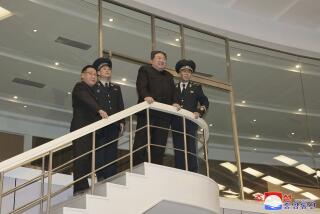Asian Governments Losing Battle Against Satellite TV : Communications: Broadcasts from foreign countries spread rapidly. Officials fret over the impact on values and their own political control.
- Share via
SINGAPORE — Asian governments that want to control what their people see on television are fighting a losing battle with satellites and receiving dishes.
Direct broadcasts from foreign countries into private homes via satellite are spreading rapidly.
Some officials fret over the impact on their people’s values and way of life. Western diplomats say others fear that their social and political control might be questioned if citizens have wider freedom of choice.
Ever smaller and cheaper receiving dishes and the launch of a major telecommunications satellite make it increasingly difficult for governments to deny viewers direct access to foreign television.
“We may not be able to check foreign TV intruding into our lives for much longer,” Prime Minister Lee Kuan Yew of Singapore said in 1988, but he has done a pretty good job so far.
The only known satellite-reception dish not in his government’s hands that is capable of receiving foreign programs sits on the roof of the U.S. Embassy. Installation was permitted “strictly for embassy use” two years after an application was filed.
Others in this prosperous city-state are prohibited by law from owning or selling such dishes, except for export. Foreign programs for the three Singapore Broadcasting Corp. channels are screened to “filter out unacceptable and harmful values and lifestyles,” said communications official Mah Bow Tan.
One official said full access to foreign TV shows, permissive American offerings especially, could harm a young nation composed of different races, religions and cultures. He said censorship of foreign movies, magazines and TV was necessary to repel cultural subversion.
Not everyone agrees. Lim Boon Heng, a member of Parliament, said the government should consider broadcasting to the surrounding region by satellite and stop trying to control the use of receiving dishes.
Compact new receivers are small enough to fit into a suitcase, and Lim said: “When dishes get to that size, the authorities will have a hard time to control the use of satellite receivers . . . so why fight it?”
A major enemy in this information war is positioned slightly to the east and 22,753 miles up. AsiaSat-1 was launched from China in April by a Long March III rocket and is in orbit near the Equator.
Telecommunications satellites are not new to the region. Indonesia was the first country in Asia and third in the world, after Canada and the United States, to have a domestic satellite. Japan and Australia also have communications satellites.
AsiaSat-1, the first privately owned satellite, has the potential to beam signals to and from the Middle East, Singapore and Tokyo, and could offer a dozen new channels to an area with more than 2 billion potential viewers. The owner is a consortium led by Hutchison Whampoa (Holdings) Ltd. and based in Hong Kong.
In Indonesia alone, where reception from the government’s Palapa series of satellites was established in 1976, an estimated 25,000 dishes can pick up AsiaSat-1.
Hong Kong officials announced in early August that individuals could own and operate dishes for personal use without licenses, lifting a ban that had been widely ignored for years. Broadcasters and operators of dishes that serve more than one viewer must have licenses.
Elsewhere, the picture is equally mixed.
Satellite dishes are legal in the Philippines upon approval of an application, but few applications are approved. Those who can afford it put them up anyway, apparently assuming the government has more important rules to enforce.
Direct reception of satellite television still is forbidden in Thailand, which maintains close control over telecommunications, but pressure against the policy is increasing.
“We cannot stop technologies from growing,” Joompol Rodcumdee of Chulalongkorn University in Bangkok told a regional seminar on the socioeconomic impact of broadcast satellites.
“Today we may say we will not use them, but tomorrow we may not be able to get away from them,” he said.
Vijay Menon, secretary-general of the Asian Mass Communication Research and Information Center, said the estimated 150,000 satellite dishes in South Korea were “not viewed as a blessing or even as a sign of progress.”
“Journalism professors have been filling local newspapers with letters denouncing the impact of foreign TV on Korean society,” he said. “Foreign programs, they feel, are making viewers in Korea adopt alien ways of thinking, life and customs and deepening the dependency of Korea on alien culture.”
Malaysia bans private satellites for direct TV reception, and Madzhi Johari of the government broadcast training institute said: “Direct access to broadcasting satellites means direct import of norms and values of the developed countries and will result in stress and conflict in our society.” Indonesians seem relaxed about the impact of numerous private dishes, which fall into a legal no-man’s land, neither permitted nor forbidden.
More to Read
Sign up for Essential California
The most important California stories and recommendations in your inbox every morning.
You may occasionally receive promotional content from the Los Angeles Times.












